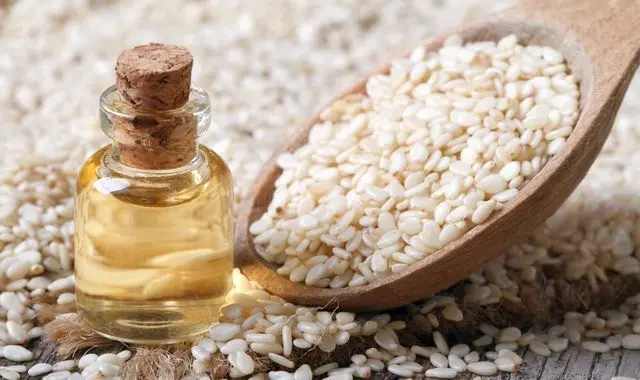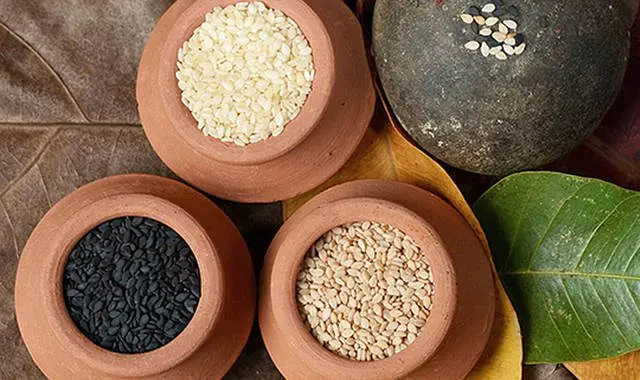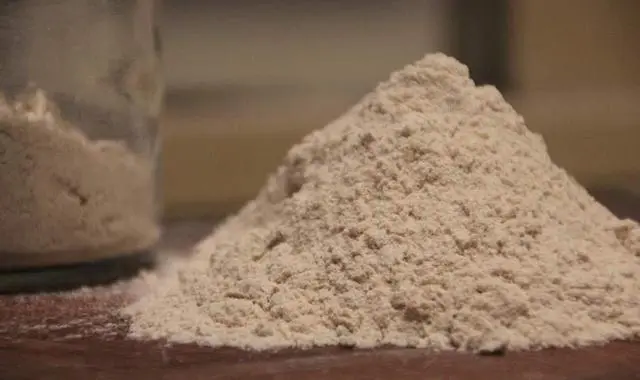Contents
- General benefits
- 1. Is a source of cholesterol-lowering phytosterols.
- 2. Strengthens the heart.
- 3. Reduces blood pressure.
- 4. Fights cancer.
- 5. Helps to burn fat.
- 6. Promotes the absorption of nutrients.
- 7. It is a rich source of vitamins and minerals.
- 8. Suitable for vegetarians.
- 9. Prevents diabetes.
- 10. Supports the health of the digestive system.
- 11. Reduces the symptoms of arthritis.
- 12. Supports the health of the bronchopulmonary system.
- 13. Protects against radiation contamination.
- 14. Strengthens bones.
- 15. Supports oral health.
- 16. Eliminates the effects of alcohol consumption.
- 17. Eliminates anxiety.
- 18. Supports the health of the eyes, heals them.
- 19. Has anti-inflammatory effect.
- Benefits for women
- Skin Benefits
- Hair Benefits
- Benefits for men
- Harm and contraindications
- Chemical composition of the product
- Conclusions
- Sources of Research
- Additional useful information about sesame seeds
Sesame considered one of the most ancient foods on Earth. Sesame plants are grown primarily for their seeds and seed oil. Sesame seeds are highly prized in Eastern, Mediterranean and African cultures. They have been used for thousands of years to flavor dishes, provide the body with the necessary supply of fats, improve skin condition, and more. The benefits and harms of sesame seeds are considered from all sides.
In addition to their use in cooking, these seeds have nutritional, preventive and medicinal properties that make them suitable for use in traditional medicines. Sesame oil is a rich source of phytonutrients such as omega-3, omega-6 fatty acids, flavonoid phenolic antioxidants, vitamins, and dietary fiber.
General benefits
1. Is a source of cholesterol-lowering phytosterols.
Recent research on phytonutrients has revealed that sesame seeds contain fatty acids and antioxidants. This finding suggests that sesame has phytoestrogenic and cholesterol-lowering properties. Sesame takes one of the leading places among nuts, seeds, legumes and grains in terms of the amount of phytosterols that lower cholesterol levels.
Phytosterols are plant sterols and are structurally similar to cholesterol. They work in the intestines and are aimed at reducing the absorption of cholesterol. Phytosterols displace cholesterol in the intestinal tract, decreasing the amount of available absorbable cholesterol.
Some studies have shown that among 27 different nuts and seeds tested, sesame, along with wheat germ, came out on top as the product with the highest phytosterol content.
Sesame contains approximately 400 grams of phytosterols for every 200 grams of seeds. The specific type of phytosterol it contains is called beta phytosterol. It helps to improve the health of the prostate gland and also normalizes blood pressure.
2. Strengthens the heart.
Research shows that the lignans in sesame seeds help improve lipid profiles and normalize cholesterol and blood pressure. Lignans (a group of plant-based phenolic compounds) naturally help lower cholesterol levels in several ways: they can lower serum and liver cholesterol levels. For this reason, researchers sometimes characterize sesame as a “cholesterol-lowering agent.”
A study of healthy people showed that with a daily intake of 50 grams of sesame seeds for five weeks, the following improvements occur: total cholesterol levels, LDL cholesterol (bad cholesterol) and HDL (good cholesterol) cholesterol levels, and antioxidant status are normalized.
Sesame prevents the formation of atherosclerotic plaques and therefore prevents the development of atherosclerosis. Sesame seeds contain an antioxidant and anti-inflammatory compound called sesamol, which also has anti-atherogenic properties that improve cardiovascular health. Sesame is rich in oleic acid, which helps lower bad cholesterol and increase good cholesterol. This reduces the risk of coronary ischemia.
https://www.youtube.com/watch?v=JLeX_7C6Gz0
3. Reduces blood pressure.
Sesame is considered a powerful antihypertensive because it helps to normalize blood pressure levels. One 2006 study published in the Yale Journal of Biological Medicine examined the effects of sesame seeds taken daily for 45 days on adults with hypertension. Research has shown that sesame seeds can be an excellent natural remedy for lowering blood pressure.
After tracking various health markers of 32 hypertensive patients aged 35 to 60 years who consumed sesame seeds for 45 days, the researchers found that sesame seeds helped to significantly lower blood pressure, reduce lipid peroxidation, and increase antioxidant status in most patients.
4. Fights cancer.
Whole sesame seeds are a rich source of mammalian lignan precursors called enterolactone and enterodiol. They are produced by the microflora in the colon. Recent studies have shown that mammalian lignans have potential anti-cancer properties, especially in the prevention of colon and breast cancer.
A 2005 study by the Department of Nutrition at the University of Toronto examined the effects of 25 grams of sesame seeds per day on the health of postmenopausal women. The study was conducted over four weeks.
Urine test results showed an increase in mammalian lignans in women consuming sesame seeds. This indicates that these substances are actively absorbed by the bacterial flora in the large intestine, helping to protect it from oxidation and the development of colon cancer.
Another 2012 study published in the Journal of Nutrition also found that dietary lignans may act as a cancer treatment and reduce the risk of breast cancer by altering tumor characteristics.
After examining 683 women with breast cancer and 611 healthy women who received lignans, it was found that women with the highest intake of lignans, compared with the lowest, had a 40-50% reduction in the risk of developing breast cancer.
In addition to all of the above, sesame seeds contain magnesium, which has anti-cancer properties. Sesame also contains an anti-cancer compound called phytate. Sesame seeds have been shown to be effective in reducing the risk of colorectal tumors, which prevents colorectal cancer.
5. Helps to burn fat.
The fats in sesame seeds stimulate the production of hormones in our brains that make us feel full and satisfied. Thanks to them, we stay full much longer. Essentially, all the healthy fatty acids reduce the amount of ghrelin, the hunger hormone.
Therefore, fats, albeit indirectly, have an effect on weight loss. Some of the phytochemicals found in sesame seeds are known to be part of the lignan family, which means sesame is beneficial for metabolism and fat burning.
Animal studies show that sesame seeds and the lignans they contain enhance important liver mechanisms. They can increase the rate of fat burning by improving the activity of several liver enzymes whose function is to break down fatty acids. This is one of the reasons why there are some fat burning and bodybuilding supplements available on the market today that contain the active ingredients from sesame seeds.
6. Promotes the absorption of nutrients.
Sesame seed lignans act as compounds important for antioxidant activity as they aid in the absorption of vitamin E and other phytochemicals. To absorb fat-soluble nutrients, including vitamin A, vitamin D, and many types of antioxidants, you need to eat fat. Including healthy and healthy fats in your diet, such as sesame seeds and sesame oil, can help the body absorb and use nutrients.
7. It is a rich source of vitamins and minerals.
Sesame is a source of iron, dietary fiber, magnesium, phosphorus, potassium, copper and manganese. It contains various minerals and even protein. Sesame helps prevent iron deficiency, which can cause anemia and increased fatigue. A sufficient amount of copper in sesame seeds supports the health of the nervous system, bones and speeds up metabolism. Sesame also contains high amounts of calcium, however there is some controversy regarding the benefits of this element.
Sesame seeds contain some natural substances that can block the absorption and use of a significant percentage of calcium in the body. Calcium is bound to oxalic acid, making it less readily available for absorption.
It is believed that toasting sesame seeds at high temperatures can break down most of the oxalates. This is an advantage, of course, but the roasting process can cause some health problems due to damage to the delicate oils in the seeds.
8. Suitable for vegetarians.
Sesame seeds are a rich source of dietary protein, with high quality amino acids making up 20% of the seeds. Thus, they are ideal for a high-protein vegetarian diet.
9. Prevents diabetes.
Sesame seeds contain magnesium and other nutrients that have been shown to fight diabetes. The use of sesame seed oil as the sole edible oil has been found to be effective in lowering blood pressure and lowering plasma glucose levels in hypersensitive diabetic patients.
10. Supports the health of the digestive system.
Sesame seeds support the health of the digestive system as they are rich in fiber. The high fiber content helps in the smooth functioning of the intestines, which facilitates the elimination of waste and relieves constipation.
11. Reduces the symptoms of arthritis.
Sesame seeds contain copper, a mineral that is vital for antioxidant enzyme systems. It reduces pain and swelling caused by arthritis. In addition, this mineral provides strength to blood vessels, bones and joints.
12. Supports the health of the bronchopulmonary system.
The magnesium found in sesame seeds prevents asthma and other respiratory diseases by preventing airway spasms.
13. Protects against radiation contamination.
Found in sesame seeds and sesame oil, sesamol has been found to prevent radiation damage to DNA, intestines, and spleen.
14. Strengthens bones.
Sesame seeds contain zinc, which increases bone mineral density. Deficiency of this mineral can cause osteoporosis. Sesame seeds are an excellent source of calcium, a mineral next to zinc that is vital for bone health.
15. Supports oral health.
Sesame seeds and sesame seed oil help maintain oral health by removing plaque and whitening teeth. By rinsing your mouth with a solution of sesame seed oil, you can reduce the number of streptococcal infections in both your teeth and saliva, as well as improve overall dental health.
16. Eliminates the effects of alcohol consumption.
Sesame seeds help the liver break down and remove ethyl alcohol and other substances that cause poisoning from the body.
17. Eliminates anxiety.
Sesame seeds contain several nutrients that contribute to resilience to stress. Minerals such as magnesium and calcium act as an antispasmodic by regulating muscle function, i.e. muscle contraction and relaxation. Thiamin (Vitamin B1) has sedative properties that aid in the proper functioning of the nerves.
A deficiency in this vitamin can lead to muscle cramps, moodiness and depression. Sesame seeds also contain tryptophan, an essential amino acid that is involved in the production of serotonin. The latter is a neurotransmitter that reduces pain and regulates sleep patterns and mood. Inadequate production and transmission of serotonin in the brain can lead to anxiety and depression.
18. Supports the health of the eyes, heals them.
According to traditional Chinese medicine, there is a strong relationship between internal organs and external organs, such as the eyes and liver. The liver functions as a blood depot, and since a certain branch of the liver canal goes to the eyes, this organ can also send blood to the eyes to support their function.
Sesame is good for the liver as it increases the concentration of blood in this organ, thereby nourishing the eyes. The therapeutic effect of sesame seeds is to cure blurred vision, relieve fatigue and eliminate dry eyes.
19. Has anti-inflammatory effect.
The use of sesame seeds and sesame oil (both internally and topically) reduces the symptoms of diseases caused by inflammation. The high amount of copper in this product helps patients manage inflammation more easily.
Benefits for women
20. Normalizes the balance of hormones.
Research shows that sesame seeds can also positively influence the production of sex hormones through improved fatty acid metabolism, especially in post-menopausal women.
In a 2009 study published in the Journal of Nutrition, it was found that consuming sesame seeds had a positive effect on blood lipids and antioxidant status in adult women, respectively, on their sex hormones.
It has been proven that sesamin, sesame lignan, is converted by the intestinal microflora into enterolactone, a phytoestrogen compound with estrogen-like activity. In addition, sesamin showed an enterometabolite activity similar to that found in flax lignans.
A study was conducted on the effect of 50 g of sesame seed powder taken daily on sex hormones, lipids and oxidation levels in 26 postmenopausal women. The study was conducted over five weeks.
As a result, the study group showed an improvement in the binding and production of sex hormones, as well as a decrease in total cholesterol levels and an improvement in antioxidant status. Since sesame seeds are rich in important nutrients, proteins and fats, they are also an excellent food for maintaining health during pregnancy.
21. Useful for pregnant women.
The high calcium content of sesame seeds contributes to the proper formation of the fetal skeleton and strengthens the bones of the mother. Fatty acids improve intestinal motility, relieving the pregnant woman of constipation. Sesame soothes the nervous system. In addition, sesame seeds contribute to increased production of breast milk, as well as increase its fat content and improve taste. The pumping process is easier, the risk of mastopathy is reduced.
22. Other benefits for women.
Sesame seeds relieve PMS symptoms, normalize the psycho-emotional state, the menstrual cycle, and increase sexual desire. Sesame also helps with vitiligo (pigmentation disorder, characterized by the disappearance of the melanin pigment in some areas of the skin), which most often affects the female body.
Skin Benefits
Sesame is rich in powerful antioxidants, antibacterial and antiviral properties. The oil extracted from sesame seeds is rich in omega-6, calcium, magnesium, phosphorus, iron, and vitamins B and E.
23. Eliminates fungus.
Sesame is a natural anti-inflammatory agent with excellent healing properties. Antibacterial properties help to get rid of skin pathogens such as staphylococcus and streptococcus, as well as common skin fungi.
24. Heals sunburn.
Sesame seed oil helps speed up the healing of sunburn. It prevents damage to the skin from harmful UV light from the sun’s rays, preventing the appearance of wrinkles and pigmentation. Regular use of this oil significantly reduces the risk of skin cancer.
25. Detoxifies the skin.
The antioxidants found in sesame seeds help in detoxifying the skin. And when sesame oil is applied to the skin, its molecules will attract fat-soluble toxins, which can then be washed off with hot water and soap.
26. Revitalizes the skin.
Sesame seeds and oil from them maintain the elasticity of the skin, keeping it soft and tender. Small cuts, scrapes and abrasions heal. Sesame neutralizes “poisons” that form on the surface of the skin and in the pores.
27. Heals chapped feet.
If you have cracked feet or feel pain in your feet, you can apply sesame seed oil to them at night before bed and wear cotton socks. This procedure should be carried out for several days so that the feet become soft and tender.
Hair Benefits
28. Stimulates hair growth.
Sesame seeds are rich in vitamins, nutrients and minerals vital for maintaining healthy scalp and hair. Sesame seeds contain omega-3, omega-6 and omega-9 essential fatty acids that promote hair growth. Sesame seed oil stimulates hair growth, nourishes and conditions hair, and promotes a healthy scalp. Regular massage with warm sesame oil improves blood circulation, thereby accelerating hair growth.
29. Prevents scalp problems.
Massaging the scalp with sesame seed oil helps to eliminate dryness, flaking and clogging of the pores of the scalp, which means that it prevents thinning and hair loss. In addition, the anti-fungal, anti-bacterial and anti-inflammatory properties of sesame help in treating scalp infections, dandruff, they soothe irritated scalp.
30. Conditions the hair.
Sesame seed oil deeply conditions dry, damaged hair, split ends or chemically treated strands. It helps moisturize and strengthen hair, restore its shine, elasticity and softness.
31. Improves hair quality.
Sesame has the ability to darken hair, making it effective for removing premature gray hair. For maximum results, sesame oil can be combined with oils such as olive or almond.
Benefits for men
32. Improves «male» health.
Sesame increases libido and potency, normalizes the balance of male hormones and helps to build muscle mass. Men are advised to consume both white and black sesame seeds. Both species are powerful aphrodisiacs.
Harm and contraindications
1. Excess weight.
Although sesame helps to lose weight, this does not mean that it can be consumed immensely. Sesame seeds are a fairly high-calorie product, and if consumed excessively, weight gain will undoubtedly follow. Sesame is beneficial for weight loss only when consumed in moderation.
2. Colon cancer.
The same goes for the intestines. Above, we have outlined the benefits of preventing colon cancer. However, consuming sesame seeds regularly in excess will inevitably lead to health problems.
Researchers have found that overuse of sesame seeds can burn the lining of the colon, which can trigger a fatal disease – cancer. This is one of the most dangerous side effects of sesame seeds as it can be fatal.
3. Diverticulitis.
Sesame seeds can cause diverticulitis. It is a certain medical condition in which extremely painful “sacs” form in the inner wall of the colon. This causes cramps, abdominal pain, constipation, and so on. Adjust your intake of sesame seeds to avoid surgery.
4. Allergic reactions.
Allergies are another side effect of consuming sesame seeds. If you are sensitive to sesame seeds, do not consume it to avoid food allergies. People who have difficulty digesting nuts and seeds, including almonds, flaxseeds, and chia seeds, should be careful when consuming sesame seeds.
5. Anaphylaxis.
Anaphylaxis is an extreme case of allergy caused by consuming sesame seeds. The entire body is exposed to this intense and rapid allergic reaction – there may be wheezing, hypotension, convulsions, etc. Then the person’s throat and airways are gradually blocked. As a result, the person begins to suffer from suffocation, which can lead to death.
6. Diarrhea.
According to scientists, sesame seeds have a strong laxative effect. This means that consuming sesame seeds in excess of the recommended daily allowance can cause loose stools and diarrhea. Try to be smart about using sesame seeds in your food.
7. Skin rashes.
Sesame seeds can also have adverse effects on the skin. If you overuse sesame seeds or use products that contain large amounts of sesame seed oil, you can provoke skin rashes, accompanied by itching and redness.
8. Hair loss.
Many people use black sesame seeds for optimal hair health. But overusing them can completely change the results. They can cause hormonal imbalances that can make the scalp oily and dry out the hair follicles. Consequently, the rate of hair loss will increase significantly. This can even lead to baldness.
9. Risk of miscarriage.
Consuming sesame seeds during the first trimester of pregnancy is believed to be detrimental to the health of the expectant mother. This can sometimes lead to miscarriage.
10. Gout.
Sesame seeds, as mentioned above, contain oxalates. Most of the calcium in the seed coat comes in the form of calcium oxalate. Most of the tahini (sesame paste) sold in grocery stores is most often made with seed kernels that remain after the hull is removed.
These foods are generally safe in moderation on an oxalate-restricted diet, but keep in mind that the seed coats may contain more oxalates, which can worsen some conditions, such as gout.
11. Not recommended for Wilson’s disease.
Anyone with Wilson’s disease (a genetic disorder that causes a build-up of copper in the liver) should avoid consuming large amounts of sesame seeds due to their high copper content.
https://www.youtube.com/watch?v=IeUl7W0ikz8
Chemical composition of the product
Nutritional value of sesame seeds (100 g) and percentage of daily value:
- The nutritional value
- Vitamins
- Macronutrients
- Trace Elements
- calories 565 kcal – 39,68%;
- proteins 19,4 g – 23,66%;
- fats 48,7 g – 74,92%;
- carbohydrates 12,2 g – 9,53%;
- dietary fiber 5,6 g – 28%;
- water 9 g – 0,35%.
- E 2,3 mg – 15,3%;
- V1 1,27 mg – 84,7%;
- V2 0,36 mg – 20%;
- V6 0,79 mg – 40,5%;
- B9 97 μg – 24,5%;
- PP 11,1 mg – 55,5%.
- potassium 497 mg – 19,9%;
- calcium 1474 mg – 147,4%;
- magnesium 540 mg – 135%;
- sodium 75 mg – 5,8%;
- phosphorus 720 mg – 90%.
Conclusions
Sesame is a truly unique food product. Its advantages outweigh the disadvantages by almost three times. This product will bring undeniable benefits to your body. It is useful for almost every organ. The main thing is not to overdo the dosage, otherwise it can lead to serious health problems.
Useful Properties
- It is a source of cholesterol-lowering phytosterols.
- It protects the heart.
- Reduces blood pressure.
- Fights cancer.
- Helps burn fat.
- Stimulates the absorption of nutrients.
- Rich source of vitamins and minerals.
- Suitable for vegetarians.
- Prevents diabetes.
- Good for the health of the digestive system.
- Reduces symptoms of arthritis.
- Supports the health of the bronchopulmonary system.
- Protects against radiation damage.
- Strengthens bones.
- Good for oral health.
- Eliminates the effects of alcohol intake.
- Eliminates anxiety conditions.
- Good for eye health.
- Has anti-inflammatory effect.
- Good for skin and hair.
- Good for both men and women.
Harmful properties
- Overweight.
- Colon cancer
- Diverticulitis
- Allergic reactions.
- Anaphylaxis.
- Diarrhea.
- Skin rashes.
- Hair loss.
- Miscarriage.
- Gout.
- Not recommended for Wilson’s disease.
Sources of Research
The main studies on the benefits and harms of sesame have been carried out by foreign doctors and scientists. Below you can find the primary sources of research on the basis of which this article was written:
Sources of Research
- https://www.move.va.gov/docs/NewHandouts/Nutrition/N09_WhatAreTheTypesOfFat.pdf
- https://www.ncbi.nlm.nih.gov/pubmed/2018355
- https://www.ncbi.nlm.nih.gov/pubmed/23283020
- https://www.ncbi.nlm.nih.gov/pubmed/15623244
- http://www.academia.edu/8250802/Chemical_Analysis_and_Toxicological_Assessment_of_Sesamum_indicum_Seed_Cake_on_Albino_Rats
- https://books.google.co.in/books?id=1OkrH1ZYPOwC&pg=PT380&lpg=PT380&dq=sesame+seeds+Diarrhea&source=bl&ots=H_vO_MPERT&sig=8G_FoTBcQrwMN8p4trnRlJYg-y8&hl=en&sa=X&ei=V_IPVbv1FtSSuASfiYDIBA&ved=0CCsQ6AEwAjgK#v=onepage&q=sesame%20seeds%20Diarrhea&f=false
- https://books.google.co.in/books?id=ecApYQyfVRUC&printsec=frontcover&dq=Prescription+for+Dietary+Wellness++By+Phyllis+A.+Balch&hl=en&sa=X&ei=O_oPVaWnGs-7uAShqoLQAQ&ved=0CB0Q6AEwAA#v=onepage&q=Prescription%20for%20Dietary%20Wellness%20%20By%20Phyllis%20A.%20Balch&f=false
- https://books.google.co.in/books?id=2I9wAgAAQBAJ&printsec=frontcover&dq=Handbook+of+Herbs+and+Spices++edited+by+K.+V.+Peter&hl=en&sa=X&ei=m_oPVYfcMJKLuAThsICgCQ&ved=0CB0Q6AEwAA#v=onepage&q=Handbook%20of%20Herbs%20and%20Spices%20%20edited%20by%20K.%20V.%20Peter&f=false
- https://www.medicinenet.com/script/main/art.asp?articlekey=52926
- https://en.wikipedia.org/wiki/Sesame
- https: //www.ncbi.nlm.nih.gov/pmc/articles/PMC4127822/
- https: //www.ncbi.nlm.nih.gov/pmc/articles/PMC4032840/
- https://www.naturalnewsblogs.com/10-health-benefits-sesame-even-wont-believe/
- https://books.google.co.in/books?id=qprwAgAAQBAJ&pg=PA106&dq=sesame+seeds+relieve+constipation&hl=en&sa=X&ved=0ahUKEwiU57Kbs8zNAhWKrY8KHZkUBr0Q6AEIKzAB#v=onepage&q=sesame%20seeds%20relieve%20constipation&f=false
- http://www.academia.edu/6257450/POST-HARVEST_PROFILE_OF_SESAME_CONTENTS
- https://books.google.co.in/books?id=JYPXBQAAQBAJ&pg=PA163&dq=sesame+seed+oil+dental+plaque&hl=en&sa=X&ved=0ahUKEwjZwrjCs8zNAhXKo48KHUdKDZMQ6AEINTAB#v=onepage&q=sesame%20seed%20oil%20dental%20plaque&f=false
- https://www.naturalnewsblogs.com/10-health-benefits-sesame-even-wont-believe/
- https://www.webmd.com/hypertension-high-blood-pressure/news/20030428/sesame-oil-benefits-blood-pressure
- https://books.google.co.in/books?id=pDg636LtlD8C&pg=PA331&dq=sesame+seeds+eye+health&hl=en&sa=X&ei=SLh1VcS6DMXTmAXz9oFo&ved=0CCcQ6AEwAg#v=onepage&q=sesame%20seeds%20eye%20health&f=false
- https://www.ncbi.nlm.nih.gov/pubmed/21114470
- https://books.google.co.in/books?id=9Q2pT8fgWKMC&pg=PA84&dq=sesame+seeds+antibacterial+properties&hl=en&sa=X&ei=R791Vby-FZDM8gWOt4DQDg&ved=0CCQQ6AEwAQ#v=onepage&q=sesame%20seeds%20antibacterial%20properties&f=false
- https://www.naturalnews.com/026669_oil_SAMe_pulling.html
- https://www.mum.edu/
- http://www.personal.psu.edu/afr3/blogs/SIOW/2011/09/sesame-oilnot-just-for-cooking.html
- https://books.google.co.in/books?id=Tb8cBgAAQBAJ&pg=PA21&dq=sesame+seed+oil+treats+cracked+heels&hl=en&sa=X&ei=Ish1VbWPF8zm8AW6oYDIBQ&ved=0CB4Q6AEwAA#v=onepage&q=sesame%20seed%20oil%20treats%20cracked%20heels&f=false
- https://books.google.co.in/books?id=Mu9aCAAAQBAJ&pg=PT37&dq=sesame+seed+oil+promotes+hair+growth&hl=en&sa=X&ei=b8h1Vei6PI-C8gWNgYGIBg&ved=0CB4Q6AEwAA#v=onepage&q=sesame%20seed%20oil%20promotes%20hair%20growth&f=false
Additional useful information about sesame seeds
How to eat

1. In cooking.
Probably the most popular ways to use sesame seeds are by adding them to baked goods or salads, and making sesame paste – tahini. The latter is used in hummus and other snacks made in the Middle East. Hummus is a simple and healthy combination of ingredients that you can easily make at home using chickpeas, garlic, and tahini.
Also popular in India, Greece, Sicily and France, sesame seeds are used in combination with honey to make sesame sticks. Alternatively, you can mix sesame seeds with peanut butter for a delicious, sweet snack. Sesame is sprinkled on bakery products, and sesame halva, kozinaki and sesame milk are made from it. The latter is similar in cooking method to soy milk.
2. How to take raw
Raw sesame seeds can be eaten whole or ground into flour. Sesame seeds are used to make cakes. Daily rate of seed consumption – 2-3 teaspoons. It is not recommended to fry sesame seeds, as many vitamins die during heat treatment. But it can be heated. It is also allowed to use sesame in a soaked state (this way it will be absorbed faster and better).
3. In cosmetology.

In this area, sesame seeds, as mentioned earlier, are used in the form of oil. Sesame oil retains the benefits of the seeds themselves and acquires new qualities that are indispensable in cosmetology. With the help of sesame oil, you can significantly improve the condition of the skin of the face, body, and also bring dry and brittle hair back to life. Compresses are also made from sesame seeds.
How to choose
Sesame seeds come in a variety of sizes and colors, including white, golden brown, black, yellow, and beige varieties. Black sesame seeds (most commonly found in China and Southeast Asia) have the strongest flavor, but white or beige seeds are most commonly found in many American and European grocery stores and restaurants.
- Sesame seeds should be clean and not bitter.
- They must be free of external damage and defects.
- A quality product is not subjected to special processing. To make sure you have a “live” product in front of you, you need to let it germinate. If the seeds, while in moisture, germinate in 2-3 days, then you have chosen a natural product.
- Sesame seeds should be: uniform in color; dry and crumbly; without a rotten smell and a strange aftertaste.
- There should be no additional impurities in the package.
How to store
- Black sesame is unpretentious to storage conditions. In the manufacturer’s packaging, it will last longer than white. But it is still better to pour the seeds into a glass or enamel container with a lid.
- Sesame does not like moisture and sun.
- Peeled white sesame seeds are stored for several months.
- It should be kept in the refrigerator.
- Unpeeled sesame seeds last longer than peeled sesame seeds. It is placed in sealed containers in a cool and dry place.
- Sesame seeds can be stored in the freezer.
- Packaged sesame is stored longer than weight.
History of occurrence
The homeland of sesame seeds is Africa and India. Then it spread to Central and Southeast Asia. Sesame seed is one of the oldest oilseeds known to man. It is mentioned in the ancient writings of Babylon and Assyria over 4000 years ago and is considered domesticated over 3000 years ago. Remains of sesame seeds recovered from archaeological sites have been dated to 3500–3050 BC.
Some records indicate that sesame was traded in Mesopotamia and the Indian subcontinent around 2000 BC.
Other finds report that sesame was cultivated in Egypt during the Ptolemyacic period. It is believed that the ancient Egyptians called it sesemt, and it was listed as a drug in the ancient scrolls of the Ebers Papyrus.
Sesame came to America in the late XNUMXth and early XNUMXth centuries with the help of African slaves and became one of the most popular spices in the southern states. The largest producer of sesame seeds today is Myanmar, and the largest exporter is India, followed by Japan and China.
How and where is it grown


Sesame seeds, known as til (in Hindi), are the oldest seasoning known to mankind. Sesame is a flowering plant in the Pedaliaceae family. There are several varieties of sesame seeds, depending on the variety: white, black and brown. White sesame seeds have a higher iron content than black sesame seeds and are mainly used as ingredients in food and as oil.
Black sesame seeds are more aromatic, contain 60% more calcium than white ones. It is they who are preferred to be used in medicines. White sesame seeds are polished, while black and brown ones retain their natural shell. After harvest, the seeds are cleaned and sorted. Any seeds that are harvested or not ripe at harvest are saved for use in sesame oil production.

The flour left over from the extraction of sesame oil (called sesame flour) contains 35 to 50 percent protein and carbohydrates, making it one of the preferred high-protein feeds for poultry and other livestock.
Note. An interesting fact is that consignments of sesame seeds of the same species (for example, all white) are perceived by consumers as of higher quality and can be sold at a higher price, although in fact black sesame is more useful.
Sesame is a thermophilic plant, therefore it does not grow in the wild in Russia, but it is grown in the Krasnodar and Stavropol Territories. Sesame grows in warm areas: North Africa, Pakistan, India, Arabia, Central and Southeast Asia, the Caucasus.
Interesting Facts
- There are about 35 types of sesame seeds.
- In 2013, the world harvested a record 4,8 million metric tons of sesame seeds.
- In ancient times, sesame seed oil was used exclusively for household needs.
- In the VI century BC. sesame has been recognized as a food product.
- The Big Mac holds 180 sesame seeds.
- The Arabs believed that sesame had magical properties.
- Sesame is the second name for sesame seeds. In English, black sesame is referred to as black sesame. Even Herodotus called sesame sesame in his notes.
- In ancient times, sesame seed was used in attempts to create an elixir of immortality.
- In the wild, sesame grows only in some parts of Africa.
- Sesame oil retains all its beneficial qualities for 9 years. This is not possible for most foods.










Inapendeza sana
வராது ஆனா வரும் ,
காப்பாத்தும் ஆனா காப்பாற்றாது
— நல்லா போடுங்க, விளங்கும்